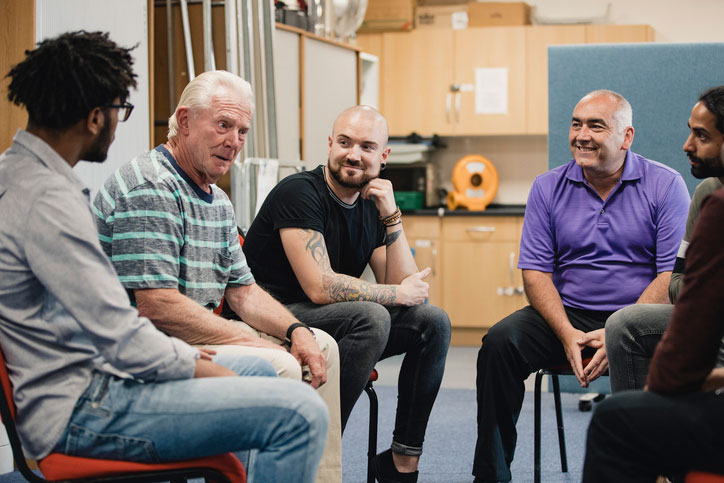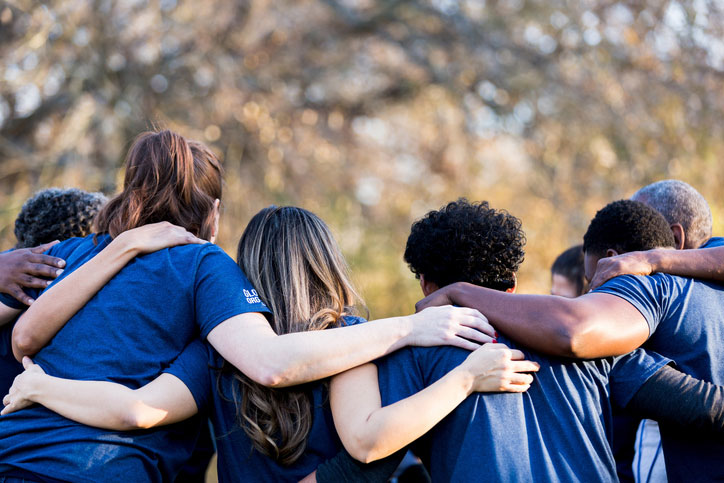Written by Helen Lewis
As a social worker, you are trained to provide critical, compassionate care to people living within a wide range of communities. From geriatric care, schools, and correctional facilities to homeless shelters, nonprofits, and courts, MSWs are likely to work with people of all ages, from many different backgrounds.
According to the National Association of Social Workers (NASW), the idea of “cultural competence” is a central tenet of social work. But what does that really mean?
What is Culture?
Whether it’s your family background, the country you come from, the language(s) you speak, or the traditions you carry, everyone comes with a way that they see the world that is colored by the many different experiences they have had, and the people they surround themselves with.
Culture encompasses the shared beliefs, customs, values, behaviors, and artifacts that characterize a particular group of people, shaping their way of life and fostering a sense of identity and belonging. It is a complex and dynamic system that includes rituals, art, social norms, food, and institutions, all of which are transmitted from one generation to the next.
Culture provides a framework for individuals to interpret their surroundings, guiding their interactions with others and influencing their perspectives on the world. It is both a product of human creativity and a force that molds individual and collective experiences, fostering a sense of continuity and cohesion within a community.
Culture is not static; it evolves over time through adaptation, innovation, and the exchange of ideas, reflecting the diverse and ever-changing nature of human societies.
Cultural Competence in Social Work
If you’re not sure what the phrase “cultural competence” means, you’re not alone: according to the Administration for Children & Families’ Office of Planning, Research & Evaluation (OPRE), some 18 different definitions of cultural competence have been circulated and offered in a number of different fields, including psychology, education, and nursing.
In social work, cultural competence refers to the way in which organizations and individuals are able to provide respectful, meaningful aid to people from diverse backgrounds in a way that supports their continued dignity and confidence. While there are a number of different forms this can take, one common model deploys three distinct elements:
- Cognitive: This step pairs critical awareness—empathetic and sensitive assessments of one’s own position, as well as the position of others—with knowledge—familiarity with a diverse range of cultures, traditions, ethnicities, races, and beliefs.
- Behavioral: Here, the social worker should be able to be able to weave in their cognitive assessments of a certain individual, group, or family with their learned abilities in providing social services. By identifying their own position and the position of the people they are working with, the social worker can communicate and collaborate with people in a way that is both effective and humanizing, which always acknowledges the dignity and intelligence of the recipients of care.
- Organizational: This step takes a broader focus on cultural competence, considering the larger institutional and cultural framework within which a given social worker’s organization operates. Social workers should be supported at the organizational level to offer cultural competence to the people they work with, which could look like adequate resources (i.e., translators) to meet the specific needs of diverse communities.
According to the National Prevention Information Network, an organization must include the following to achieve cultural competence:
- “…a defined set of values and principles, … demonstrat[ing] behaviors, attitudes, policies, and structures that enable them to work effectively cross-culturally.
- … the capacity to (1) value diversity, (2) conduct self-assessment, (3) manage the dynamics of difference, (4) acquire and institutionalize cultural knowledge and (5) adapt to diversity and the cultural contexts of the communities they serve.
- incorporate the above in all aspects of policy making, administration, practice, service delivery, and involve systematically consumers, key stakeholders, and communities.”
Anti-Racism in Social Work
In the last several years, a number of American associations for social work (including the National Association of Social Workers, the American Council for School Social Work, the Latino Social Workers Organization, the Professional Association for Social Workers in HIV & AIDS, the School Social Work Association of America, and the Society for Social Work and Research, among many others) have focused their efforts on actively cultivating anti-racism in social work.
This has included efforts like those of the Council on Social Work Education (CSWE), which has required accredited social work education programs to include units about diversity, oppression, privilege, and intersectionality since 1952. More recently, CSWE has provided these institutions with nine possible units—complete with lessons and activities—specifically about social justice and racism, with the requirement that educators must instruct students about at least two of the nine units.
In another instance, social workers, politicians, and community advocates met in Washington, D.C. to strategize and discuss the possible Supreme Court decision to deem the Indian Child Welfare Act unconstitutional.
Beyond these approaches, social workers have also gotten involved in anti-racist activism in critical areas like immigration and police reform.
Begin from Within: Locating Your Own Perspective
One of the first steps to working with cultural sensitivity as a social worker is to assess your own background: your family history, socioeconomic status (past and present), level of education, race, ethnicity, religion, age, gender, and citizenship or immigration status. Earlier in this blog post, this could be seen as the first component of cultural competence, known as the cognitive element.
MSWs are encouraged to identify which privileges they hold, and to consider the existing power dynamic between social workers and the communities they help. This way, social workers are encouraged to foster mutually empowering relationships with people accessing social workers’ services, rather than making anyone feel like a victim, or that they are helpless to help themselves.
Cultural Humility
The idea of cultural humility is also a central point of social work. That means that, as a social worker, you are equipped to provide compassionate care to diverse communities with awareness of your own racial, gender, or class privileges.
By maintaining awareness of cultural humility, you will be able to offer services to marginalized people in a way that is mutually respectful, without condescending or otherwise unequal power dynamics.
The Importance of Diversity Among MSWs
Because of this, ensuring that social work—education, professional experience, and licensure—is accessible to people of all different races, ethnicities, ages, backgrounds, and genders is essential. By maintaining a diverse workforce, social workers are best positioned to provide the best possible care to the communities they serve.
Intersectionality
As you pursue higher education, licensure, and/or employment as a social worker, you are very likely to hear the word intersectionality. But what does that mean?
First coined by professor Kimberlé Crenshaw in the late 1980s, intersectionality was originally meant to be applied within a legal context: the idea that various aspects of a person’s identity, such as race, gender, religion, mental and physical ability, or class, can intersect. When Crenshaw first developed the term, she was referring to legal limitations: courts had established legal rights that protected racial or gender-based discrimination, but there weren’t yet legal rights that considered the meeting point of both (i.e., legal rights that protect women of color).
In 2015, the idea of intersectionality hit the mainstream. Today, the idea isn’t used strictly within a legal context, and within social work, it is a critical framework to providing culturally sensitive, compassionate care to people with overlapping disenfranchised identities. For example, a pregnant woman who has limited English language skills may need specific, and sensitive, services to meet her needs. In addition to needing access to accessible health care, she would also, ideally, need an advocate who is able to communicate with her in a language that she confidently speaks and understands.
Social workers are trained to recognize these intersections. In many cases, social workers assess the unique needs of the people they work with, and one of their main roles is connecting those people to the resources they need. As a social worker within diverse communities, you will learn to identify which services are best suited to meet different people: in the above example, your cultural competence training and role as a social worker could entail calling on a reliable medical professional who is able to provide subsidized medical care, and an organization that could offer a translator-advocate to meet your client’s needs.
Navigating Diverse Communities with Sensitivity and Understanding
Another starting point for social workers is to cultivate greater cultural understanding of diverse communities, and especially if they are working within a community that is not already very familiar to them.

In addition to how this will allow everyone to feel recognized and live with dignity, it will also enable social workers to tailor the resources they provide based on what is culturally appropriate in various communities. If certain groups are particularly vulnerable to being overlooked in terms of accessing certain services, social workers can take critical roles becoming the advocates of these communities, connecting them to the resources they need.
For example, a social worker operating in a multicultural neighborhood might adapt their counseling approaches to better reflect the needs of the population they serve, such as languages spoken or holidays observed
Offering Care at the Micro, Macro, and Mezzo Levels
Within social work, cultural competence is seen as operating at three levels: micro, macro, and mezzo.
- Macro: Social work that focuses on making large-scale societal change. By getting to know people within disenfranchised communities, social workers use their knowledge of cultural competence and advocacy to become spokespeople for the rights of marginalized communities, speaking up at the local, state, and national levels. This could include work like community organizing, campaigning for public services (i.e., education, welfare), political activism, and collaboration with public services agencies.
- Mezzo: Social workers operating at the mezzo level are collaborating with small groups and families. This kind of work could include mediation and facilitating communication, such as in therapy and group therapy, education, and community building.
- Micro: This focuses on cultural competence in social work at the individual level, though it can also be used to apply to families and small groups. In this context, social work can take the form of clinical social work (i.e., diagnosis, treatment, and assessment in hospitals or private practices) and direct intervention on a case-by-case basis.
The Unique Role of MSWs
Masters of Social Work (MSWs) play a distinctive and pivotal role in promoting cultural competence within the field of social work. Cultural competence refers to the ability of professionals to effectively engage with individuals from diverse cultural backgrounds, understanding and respecting their unique perspectives and experiences.

MSWs are equipped with a comprehensive education that emphasizes the importance of cultural sensitivity, enabling them to navigate the complexities of a diverse society. Through coursework, MSW programs emphasize the significance of self-awareness, challenging biases, and developing a deep understanding of the cultural factors that influence individuals and communities.
One key aspect of the MSW’s role in cultural competence is their capacity to advocate for social justice and equity. MSWs are trained to recognize and address systemic issues that contribute to inequality and discrimination. By incorporating cultural competence into their practice, MSWs can advocate for policies and interventions that promote inclusivity and address the unique needs of marginalized populations. This advocacy extends beyond individual interactions to systemic change, contributing to a more just and equitable society.
MSWs also often serve as bridges between communities and social service agencies. Their cultural competence allows them to establish trust and rapport with individuals from diverse backgrounds, breaking down barriers to access and promoting more effective service delivery.
MSWs are skilled in tailoring interventions to align with the cultural values and preferences of their clients, fostering a more collaborative and empowering approach to social work practice. In essence, the unique role of MSWs in cultural competence not only enhances their ability to provide quality services but also contributes to the broader goal of creating a socially just and inclusive society.







